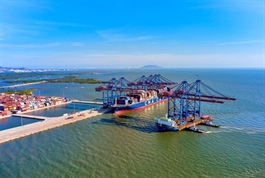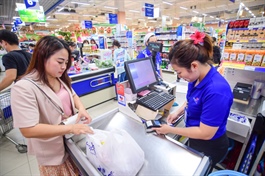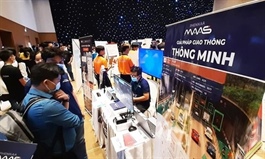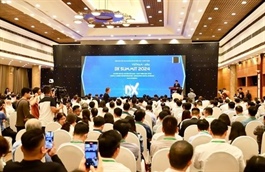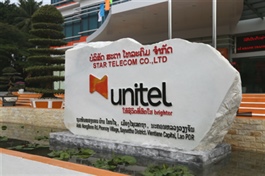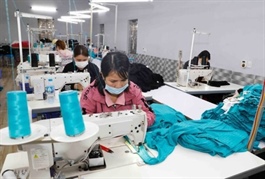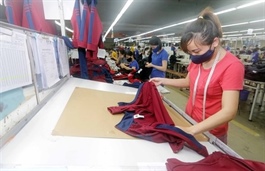Việt Nam faces green financing hurdles
Việt Nam faces green financing hurdles
Capital flows into Asia are driven by substantial infrastructure needs and the demand for green financing, as global investors have a keen interest towards financing renewable infrastructure and green projects.
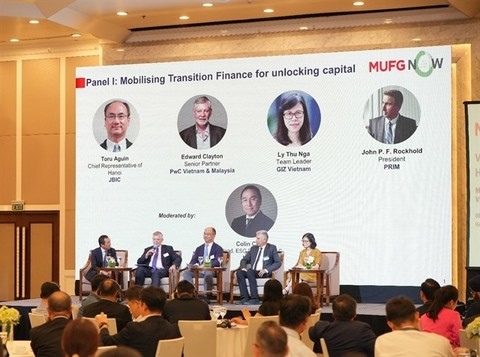
Experts discussed about mobilising finance for renewable infrastructure and green projects. — Photo courtesy of MONRE |
However, a gap exists between the funding required and provided due to Việt Nam’s still-emerging institutional setup, which hampers speedy and effective transition financing.
Edward Clayton, Senior Partner of PwC, made these statements at the launching of MUFG N0W (Net Zero World) - the flagship Environmental, Social and Governance (ESG) thought leadership and networking platform by MUFG Bank that engages the private and public sectors to address the challenges and opportunities of Asia’s sustainable development.
The event draws in around 160 regulators, policymakers, top clients, industry experts and partners to discuss the country’s net zero journey.
“Deploying financial resources justly and equitably is very important, and Việt Nam’s national financing policy will need to reflect not just its net zero goals, but also adapt to the characteristics and requirements of each period of the country’s development," said Nguyễn Việt Dũng, General Director at the Centre for Natural Resources and Environment Communication under the Ministry of Natural Resources and Environment, which also partnered MUFG for this event.
“A green transition can only become a reality with the engagement of all levels, sectors, business communities and people,” he said.
Việt Nam has made impressive strides in its energy transition journey, as its global ranking in terms of installed solar capacity has risen from 196th to 8th in the past 10 years, and it leads all ASEAN nations in the share of renewables in its power mix. The conference also discussed key imperatives required to make further progress on greening Việt Nam’s energy system, spurring technology development and mobilising sustainable finance through policy support.
Masakazu Osawa, MUFG Bank’s Chief Executive for Asia Pacific, said: “While Asia is the fastest-growing region globally, we have the most to lose from global warming, with a recent report by the World Meteorological Organisation (WMO) stating that Asia remains the world’s most disaster-hit region from weather, climate and water-related hazards in 2023. We also believe that for Asia to decarbonise, we need to focus on engagement instead of divestment, in this case through proactive regulatory outreach and financial support.”
Mobilising transition finance to unlock capital
Finance is a key enabler of change. However, only about 14 per cent of global climate finance has been channelled to Asia (excluding China).
Senior representatives spoke across a range of topics from the drivers of capital flows to Asia to expectations of Việt Nam’s upcoming green economy, including the role of blended finance and the implementation of the Just Energy Transition Partnership (JETP) in the country.
Lý Thu Nga, Team leader of the Green Financial Sector Reform Component of the Macroeconomic Reform/Green Growth Program at the German Agency for International Co-operation (GIZ) said: “Transition finance needs also focus on decarbonising economic, high-carbon sectors and financing green economic activities, with a balance in achieving economic growth and addressing net-zero targets”.
John Rockhold, President of the Pacific Rim Investment and Management (PRIM) and Head of VBF Power and Energy working group, said that coal and gas are expected to be the near-term priority, and should be gradually phased out after 2030 through a planned transition that is just and does not disrupt livelihoods. The bankability of electricity generation projects is expected to improve as revised power purchase agreement terms are being reviewed by both private and public sectors.
Toru Aguin, Chief Representative of Hà Nội at the Japan Bank for International Co-operation (JBIC) said that gas is seen as a transition energy source and JBIC mobilises capital to support the construction and set up of new gas-fired power plants in Việt Nam.
He discussed hurdles related to the transmission of renewable energy, legal constraints and the rapidly changing business environment for decarbonisation, suggesting that external support from Japan could help alleviate some of these issues due to its prior experience in developing energy supply chains.







